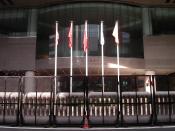It was no by mere accident that the second half of the 20th century proved to be much better than the first. It happened mainly because in the period surrounding the end of World War II some remarkable world leaders, including great Americans, worked hard to create institutions in which different nations could cooperate for the common good. International cooperation is not a useless abstraction. It has been a powerful and tangible force driving global prosperity. Today the international system and its institutions are under unprecedented stress. Deep disagreements have emerged over the best way to combat new threats to international peace and security and over how best to preserve and extend prosperity. It is time to stop blaming the institutions and recognize that they are no better or worse than what the major powers put into them in term of leadership, the will and the ideas for reforming them, skillful bilateral diplomacy and resources.
A healthy multilateral system depends on negotiations, compromises and agreements. None of these can flourish in the sour soil of acrimony that has been plowed up lately.
There are many outstanding issues on the international agenda. Not resolving them will impose a severe cost on all countries, including the most powerful. However, none deserve more attention than the WTO Doha Round that was launched in November 2001. This round was supposed to be the one in which negotiators would seriously address the issues of greatest interest to developing countries. At Doha the developing countries were skeptical of the sincerity of the rich countries to make good on this. Since then suspicions have grown sharply--for several reasons:
First off, a compromise carefully crafted over several months on how to make the Agreement on Trade-Related Aspects of Intellectual Property Rights (TRIPS) supportive of poor countries' gaining access...



Very Good.
Easy read, very informative. Only a few grammatical errors, mostly certain unspoken rules such as starting a sentence with a pronoun and using terms such as "there it". Very good paper.
4 out of 4 people found this comment useful.